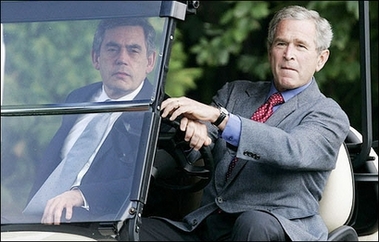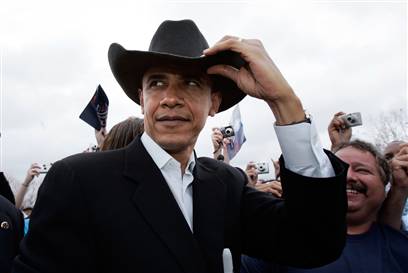Tie Vote? Obama-McCain 'Doomsday Scenario'
Presidential Election Could Result in 269-269 Electoral Vote Tie
By JENNIFER PARKER
WASHINGTON, July 17, 2008 —
Predicting the outcome of a presidential election is dangerous sport, but some political junkies are playing the game, running the numbers and coming up with a November surprise: a possible tie between Sens. Barack Obama and John McCain.
Let's call it the "doomsday scenario," and while it's highly unlikely, it is a mathematical possibility.
"Given how close it's been in the last couple years, there are some reasonable scenarios that you could get to a tie," said John Fortier, a political scholar at the American Enterprise Institute and author of "After the People Vote: A Guide to the Electoral College." "It's not the most likely scenario, but the states can add up that way where you have nobody getting to 270."
Under the sometimes wild and woolly American system of democracy, a presidential candidate must achieve at least 270 votes in the 538-member electoral college to win the White House.
If, for example, Obama wins all the states Sen. John Kerry, D-Mass., won in 2004, and picks up Iowa, Nevada and New Mexico, McCain and Obama would each win 269 electoral college votes -- locking the presidential election in a tie.
"It is implausible, but given what has happened in the last two elections you cannot thoroughly dismiss the implausible," said Jennifer Duffy, who analyzes Senate races for the nonpartisan Cook Political Report.
Under the 12th Amendment of the U.S. Constitution, if one candidate does not get 270 votes, the decision gets kicked to the House of Representatives, where each state gets a vote -- a formula that would likely guarantee an Obama victory.
"Each state delegation would have one vote and whoever won a plurality of that state's delegation would get that state's vote," said Stephen Wayne, a presidential scholar at Georgetown University.
That could get tricky, especially in states where Republican and Democratic members split the state evenly.
House Decides President in 'Doomsday Scenario'
If the election is kicked to the House, Obama or McCain would have to control a majority of the 50 state delegations to win the White House. The newly elected and re-elected House members would vote in any doomsday scenario, Fortier said.
Currently, the Democrats hold a 26-21 lead among state delegations in the House, with three states split down the middle: Arizona, Kansas and Mississippi.
The Democrats are expected to pick up even more House seats in November, which suggests Obama would coast to victory.
If neither presidential candidate gets a 26-state delegation majority in the House, then all eyes will be on the Senate, which picks the vice president in any doomsday scenario.
"The House simply must do it, but if there's no president-elect by the time the president has to take office in January, then the vice president-elect has to assume the duties of the office Jan. 20," said Walter Berns, an electoral college specialist at the American Enterprise Institute.
"The vice president could serve all four years as president unless they broke that deadlock in the House along the way," Fortier said.
Nancy Pelosi for President?
But what if there was a tied electoral vote, neither presidential candidate could get a 26-state delegation majority in the House, and the Senate deadlocked on the vice presidential pick?
Then, Fortier said, the Presidential Succession Act would kick in.
"That would be the speaker of the House," Fortier said, " So the acting president would be Rep. Nancy Pelosi."
If Congress never decides on the president or the vice president, the speaker of the House could serve all four years as president, Fortier said.
Farfetched as it may seem, an electoral vote tie has happened before.
The 1800 presidential election resulted in a tied electoral vote between Thomas Jefferson and Aaron Burr. The House ultimately decided in Jefferson's favor, which is why it's Jefferson's likeness you see on Mount Rushmore and on the nickel instead of Burr's.
That presidential election hiccup led to the 12th amendment to the U.S. Constitution, which says the House picks the president and the Senate decides the vice president.
Congress again intervened in disputed elections in 1824, and in 1876, which was ultimately decided by a special electoral commission.
Say What?! 'Doomsday' Possible but Unlikely
There is a 0.48 percent chance of an electoral tie, according to Nate Silver, who runs the
FiveThirtyEight.com: Electoral Projections Done Right Web site that has run the numbers on various election-night scenarios.
That's about a one-in-200 chance of the doomsday scenario actually happening.
"It's still a possibility this year," said Nathan Gonzales, political director of the nonpartisan Rothenberg Political Report. "It's unlikely but it could happen."
Before the 2004 election, The Washington Post reported that a computer analysis found no fewer than 33 combinations in which 11 battleground states could divide to produce a 269 to 269 electoral tie.
It's hard to imagine an election closer than 2000, where former Vice President Al Gore won the popular vote, but President Bush won a majority of electoral college votes.
But November's presidential election is gearing up to be closer than expected. Despite public unease with the war in Iraq, an economy in turmoil, and an unpopular Republican president, Obama leads McCain by only 3 percentage points among likely voters, according to the latest ABC News/Washington Post poll.
Campaigns Fight for Battleground States
The electoral vote numbers game is why the campaigns spend millions of dollars on television ads and get-out-the-vote organization in key battleground states.
Florida, the state that ultimately decided the 2000 election, has 27 electoral votes up for grabs -- the biggest electoral prize of the battleground states. Next is Pennsylvania with 21 electoral votes, Ohio with 20 electoral votes and Michigan with 17 votes.
The presidential and vice presidential candidate who win the popular vote get all the electoral college votes every state except Nebraska and Maine, which allocate their electoral votes proportionally.
With more than three months to go before Americans go to the polls, political junkies are running the electoral vote numbers, as are the campaigns, all trying to figure out which state will hold the key to the White House.
"We've identified 14 battleground states where the candidates and the campaigns are going to devote the most resources and spend the most time," said ABC News political director David Chalian.
Key battleground states include Florida, Pennsylvania, Ohio, Michigan, Virginia, Missouri, Wisconsin, Minnesota, Colorado, Iowa, Oregon, New Mexico, Nevada, and New Hampshire.
"The three toughest blue states that the Obama folks have to defend are going to be Michigan, Pennsylvania and New Hampshire," Chalian said. "Those are the three targets for the McCain campaign to try to flip red."
November Election a 'Toss Up'
Political analysts say many of the key battleground states are repeats from 2004, but there are some new states where either candidate could make a move.
"You still have to look at Ohio, Florida and the three states that flipped between the two parties which would be New Hampshire, Iowa and New Mexico," said Gonzales of the Rothenberg Political Report. "But I think this year some of the newer battlegrounds are Colorado, Nevada, and we could see Michigan come into play."
The Cook Political Report, a respected election handicapper, sees the November election as a toss-up, with McCain currently holding a 240 to 219 electoral vote edge.
"What we're looking at is a very, very narrow group of states with 79 electoral votes up for grabs," Duffy said.
"There are not an infinite number of scenarios, but there are certainly many, many possibilities," she said.










